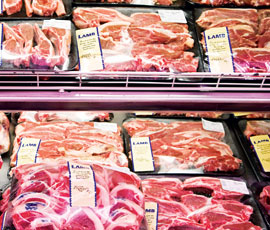Eat less meat to boost farm efficiency

Farming efficiency must be improved and meat consumption reduced to combat global warming, say experts.
If today’s meat-eating habits continue, the predicted rise in the global population could spell ecological disaster, according to research from Exeter University.
But changes to lifestyle and farming systems could help to mitigate climate change by making space for growing crops for bioenergy and carbon storage.
People should eat less meat and recycle waste to rebalance the global carbon cycle and reduce the risk of dangerous levels of climate change, the study recommends.
Lead researcher Tom Powell said: “Our research clearly shows that recycling more and eating less meat could provide a key to rebalancing the global carbon cycle.
Livestock production accounted for 78% of agricultural land use today, the report says.
“Meat production involves significant energy losses: only around 4% of crops grown for livestock turn into meat.
“By focusing on making agriculture more efficient and encouraging people to reduce the amount of meat they eat, we could keep global temperatures within the two degrees threshold.”
Findings from the research team were published in the journal of Energy and Environmental Science on Wednesday (20 June).
To feed a global population of 9.3bn by 2050, the research says farming efficiency must be dramatically increased by eating less beef, recycling waste and wasting less food.
These changes could reduce the amount of land needed for farming, despite the increase in population, leaving sufficient land for some bio-energy.
To make a really significant difference, average global meat consumption must be reduced from 16.6% to 15% of average daily calorie intake – about half that of the average western diet.
Changing the way land is used and dedicate enough space to growing bioenergy crops could bring down atmospheric carbon dioxide to safe levels.
But not doing this risks losing natural ecosystems and facing increasingly dangerous levels of atmospheric carbon dioxide.
Scenario forecasts
The research team generated four different future scenarios to 2050: ‘high-meat, low-efficiency’, ‘low-meat, low-efficiency’, ‘high-meat, high-efficiency’ and ‘low-meat, high-efficiency’.
The different agricultural options looked at the type of livestock being produced, with beef being the least energy-efficient and pork being the most.
They also looked at how intensively animals are farmed and examined options for reducing food waste and making better use of manure to make livestock farming more efficient.
They used established mathematical models to forecast the effects of each scenario.
By 2050, a ‘high-meat, low-efficiency’ scenario would add 55ppm of carbon dioxide to the atmosphere, whereas a ‘low-meat, high-efficiency’ approach could remove 25 ppm.
A 25 ppm reduction could mean we avoid exceeding the two-degree rise in global temperatures that is now widely accepted as a safe threshold, the researchers said.
Co-author Professor Tim Lenton said: “Bioenergy with carbon storage could play a major role in helping us reduce future levels of atmospheric carbon dioxide.
“However, we only stand a chance of realising that potential, both for energy and carbon capture, if we increase the efficiency of agriculture.
“With livestock production accounting for 78 per cent of agricultural land use today, this is the area where change could have a significant impact.”
